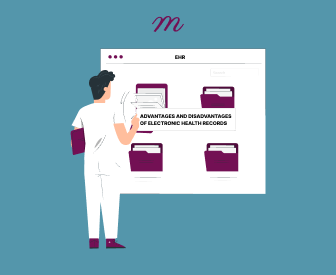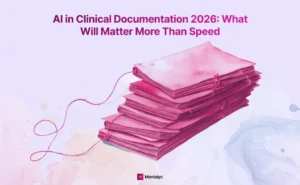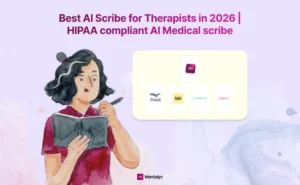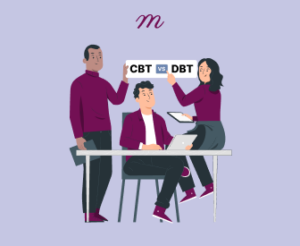Electronic Health Records (EHRs) help to give clearer, more organized, and high-quality mental health support. This digital software system aims to replace manual documentation. It is created with the sole purpose of managing client information easily. Most therapists make use of Electronic Health Records to improve client care.
EHRs facilitate therapists and client communication through its client portal. It is also useful in improving efficiency in tasks such as appointment scheduling, writing notes, and billing. With EHRs, client records are secure and protected from damage or loss.
Importance of Electronic Health Records
Electronic Health Records (EHRs) are safe online files that hold client information. They include session notes, treatment history, and medications. EHRs are stored on computers, secure servers, or in the cloud. It helps therapists to find and review their clients’ health records quicker.
EHRs help therapists stay organized and efficient. They make both administrative tasks and client care easier to manage. Most EHRs track medications and reduce the chance of errors. This leads to more focused, and supportive client sessions.
Advantages of Electronic Health Records
The use of Electronic Health Records is beneficial to therapists. These benefits include:
1. Quick Access to Clients’ Data
Electronic Health Records give therapists easy access to their clients’ health records. This makes it possible for therapists to provide better care. For example, your new client relocated to California from Houston. She has been managing anxiety for over two years. EHR is helpful in this case, as you can easily track her progress over time despite the relocation. Her Electronic Health Records will save you time from reading and flipping through handwritten notes. It gives immediate access to her past records, prescriptions, and progress notes. With this, the therapist can create an effective treatment plan, and the client can have fulfilling therapy sessions.
2. Simple and Effective Operations
Mental health practitioners can save time by not having to go through complicated piles of paper records. EHRs allow therapists to access health records faster with a few mouse clicks and search tools. The use of EHRs makes it simple to create well structured progress reports which can be communicated to other mental health professionals. Electronic Health Records help to boost the productivity of your mental health practice. It also makes appointment scheduling easier thereby reducing no-shows.
3. Improved Health Care Services
Mental health professionals can monitor the progress of a client’s treatment plan. Where clinical decisions about a client need to be made urgently, mental health practitioners will be able to make such decisions without difficulty.
4. Real-Time Data Sharing and Interoperability
Therapists and other mental health workers can share information right away. This makes teamwork easier and faster.
5. Data Analytics and Reporting
EHRs can show patterns and progress using charts and reports. This helps therapists make better care decisions.
6. Client Portal
Clients can log in to see their health records, appointments, and messages. It helps them stay involved in their care. The client portals also make therapist-client interactions better.
7. Mobility
Therapists can use EHRs on laptops or tablets. It lets them work from different places without affecting workflow.
8. Customizable Documentation Templates
Therapists can use ready-made forms and notes that fit their style. It saves time and keeps things organized.
9. Saves Money Over Time
Although setting up EHR software can cost money at first, mental health practices save money in the long run. EHRs reduce expenses related to paper records and their security. They also help therapists handle invoicing and billing more efficiently.
10. It Reduces the Need for Physical File Storage
With the use of EHRs, mental health professionals can have more free space in their offices. The use of EHRs has reduced the need for loads of paperwork and file storage.
11. Continuous Support and Training
EHR systems often offer help and training. This makes it easier for therapists to learn and use the system well.
12. Smart Prescriptions
EHRs can help therapists and psychiatrists create smart prescriptions with their e-prescribe functions. This means the system checks for mistakes, like wrong doses or medicine that might cause problems. It helps keep clients safe and makes sure they get the right medicine.
Disadvantages of Electronic Health Records
There are drawbacks to using Electronic Health Records. They include:
1. Security Risks
Electronic Health Records are susceptible to hacking, i.e., it may result in unauthorized release of clients’ health information. Though EHR software is designed to meet the privacy needs of the clients, the risk of important information breaches cannot be ignored. However, lawmakers and private practice owners ensure that EHRs abide by the rules and regulations designed to protect clients’ health details. This includes following the HIPAA laws.
2. Inaccurate Data Challenges
It is possible for mental health therapists to mistype medications or forget to update the clients’ information. This can affect the treatment plans of clients by therapists. To prevent this, the health records of clients must be accurately updated when there are changes and improvements regarding the clients.
3. System Interruption
Mental health practitioners might experience interruptions due to electricity or internet problems. Other interruptions include software updates or cyberattacks. This can cause delays for therapists in rendering apt care for their clients. Mental health therapists who live in rural areas may experience unreliable internet access. This might be difficult for therapists in this area to access clients’ data when needed.
5. Learning Curve
In the development of health information technology, it might be challenging for therapists who are accustomed to paper recording. They may find it difficult to transition to a new EHR platform. Even mental health professionals with extensive experience may find some of the improved EHR software a little challenging. It may take some time for them to get used to the new system.
6. Cost of Integrating and Maintaining Electronic Health Records
The cost to install EHRs can be expensive, and it can cost therapists more for maintenance. Making use of EHRs involves buying hardware and software. It also involves converting paper charts to electronic ones. Maintenance would involve replacing hardware and upgrading software regularly. There may be extra charges for technical demands and training in the course of using EHRs.
Conclusion
Electronic Health Records offer help to therapists in accessing information about clients faster. EHRs provide accurate and current data about clients, which improves general communication among mental health professionals to help provide care to them.
Although EHRs help reduce a lot of human mistakes, like missing documents or handwriting that are impossible to read. It also has disadvantages, particularly high expenses of installing the software and privacy risks.
In addition, mental health practitioners need to maintain a balance between using EHRs and human connection. It’s important to stay focused on the client, not just the screen. Therapists should also be able to attend to clients and provide care, especially in times when the systems are down.
Mental health practitioners can implement Mentalyc to increase their productivity and treatment quality. It helps with taking and organizing therapy notes. This allows therapists to pay attention to clients rather than being consumed with administrative work. Mentalyc helps record accurate information about your clients and makes sure they are well secured.
Frequently Asked Questions
What is the Difference Between Electronic Health Records and Electronic Medical Records (EMRs)?
Although both EHRs and EMRs are electronic means of keeping clients’ data, EMRs are practice-specific. It is used within a single practice and not shared with various mental health practitioners. EHRs, on the other hand, provide complete health information of a client that can be accessible to the mental health team.
Can Clients Have Access to Their Electronic Health Records?
Yes. There are many EHR software programs that allow clients to access their data, medical results, as well as appointment schedules.
What are Some Concerns About Electronic Health Records?
Some therapists worry about privacy and security, afraid their information might be seen by others who shouldn’t see it. There are also concerns about technical problems or errors in the records. However, EHR systems use strong protections to keep information safe. Therapists also double-check records to avoid mistakes. Compliance with HIPAA policies also enforce security.
Are EHRs HIPAA Compliant?
There are different Electronic Health Records that are HIPAA compliant. Mentalyc, for instance, is an easy-to-use EHR platform. It allows therapists to create top-notch progress notes. Mentalyc ensures the client’s data is well secured and follows HIPAA rules.
Resources
Hillestad, R., Bigelow, J., Bower, A., Girosi, F., Meili, R., Scoville, R., & Taylor, R. (2005). Can electronic medical record systems transform health care? Potential health benefits, savings, and costs. Health Affairs, 24(5), 1103–1117. https://doi.org/10.1377/hlthaff.24.5.1103.
Office of the National Coordinator for Health Information Technology. (n.d.). What are the advantages of electronic health records? HealthIT.gov. https://www.healthit.gov/faq/what-are-advantages-electronic-health-records
Shanafelt, T. D., Dyrbye, L. N., Sinsky, C., Hasan, O., Satele, D., Sloan, J., & West, C. P. (2016). Relationship between clerical burden and characteristics of the electronic environment with physician burnout and professional satisfaction. Mayo Clinic Proceedings, 91(7), 836–848. https://doi.org/10.1016/j.mayocp.2016.05.007
Alomar, D., Almashmoum, M., Eleftheriou, I., Whelan, P., & Ainsworth, J. (2024). The impact of patient access to electronic health records on health care engagement: Systematic review. Journal of Medical Internet Research, 26, e56473. https://doi.org/10.2196/56473
Why other mental health professionals love Mentalyc

“If I were recommending this software to a colleague, I would tell them that it is the best thing that they could do for their practice.”
Licensed Professional Counselor

“For anyone hesitant: this is a lifesaver. It will change your life, and you have more time to be present with your patients.”
Licensed Clinical Social Worker

“Do yourself a favor, make your life easier. I found Mentalyc to be one of the best tools that I’ve ever used.”
Licensed Marriage and Family Therapist

“It immediately changed my quality of life, personally and professionally.”
Owner/Independently Licensed Marriage & Family Therapist (LMFT)






